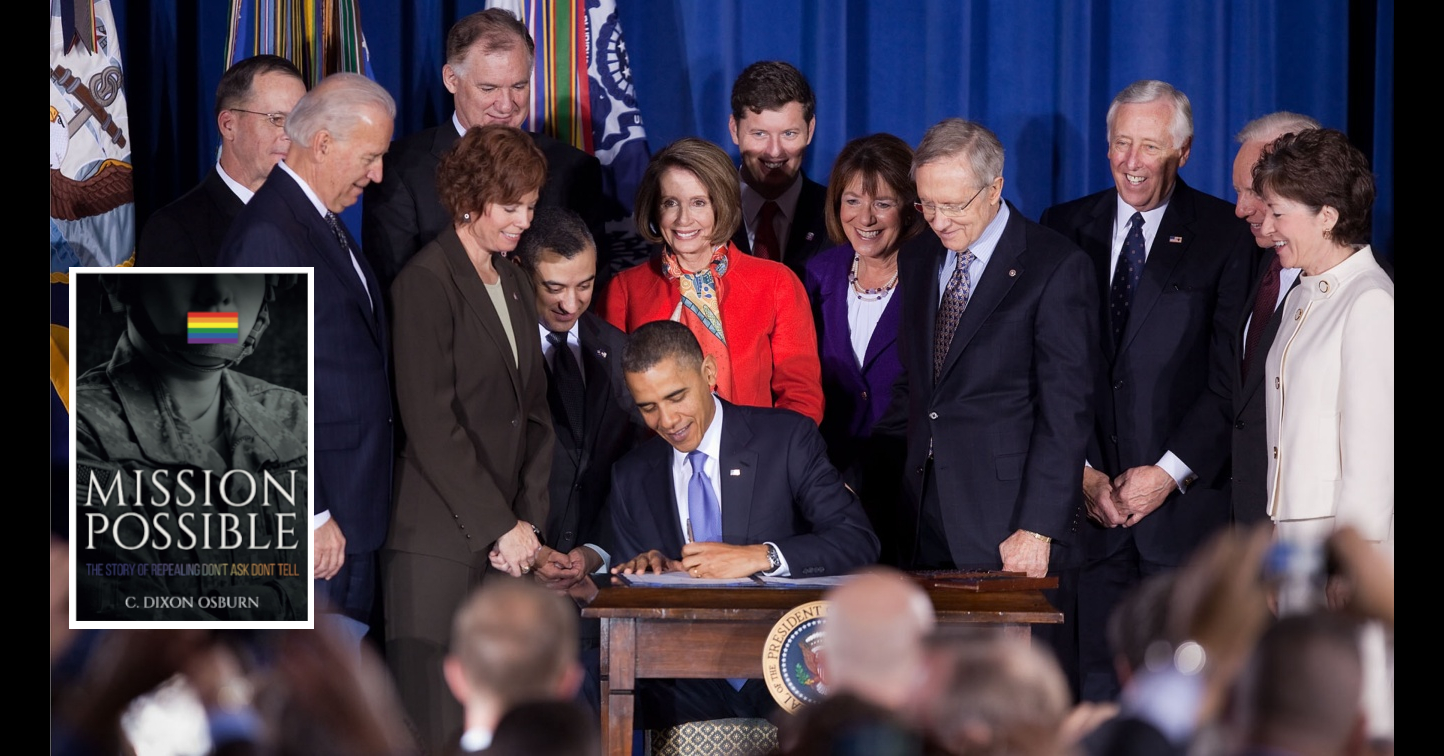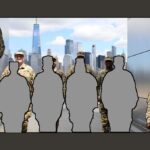
Don’t ask, don’t tell (DADT) was signed into law November 30, 1993 by the Clinton administration. It was a compromise measure intended to allow lesbian, gay and bisexual service members to serve in the U.S. military without discrimination or harassment as long as they didn’t disclose their orientation, or engage in homosexual conduct or same sex marriage. Unfortunately in practice the policy often failed to live up to its intended purpose. In 1993 Dixon Osburn and Michelle Benecke founded the Servicemembers Legal Defense Network with the goal of repealing DADT and eliminating any service bans on gay and lesbian U.S. military personnel. Dixon is in the studio today with Editor -in-Chief Jacqueline Whitt to discuss the eventual repeal of DADT and Dixon’s book Mission Possible: The Story of Repealing Don’t Ask, Don’t Tell.
While there were so many service members who actually served openly because their commanders didn’t care and didn’t want to make an issue of it, it was always this Damocles sword hanging over the necks of every service member because you just didn’t know know which service member might turn you in or which commander might make an issue of this and your career could come to a crashing halt.
Podcast: Download
Subscribe: Android | Email | RSS
C. Dixon Osburn is the author of the Amazon best seller Mission Possible: The Story of Repealing “Don’t Ask, Don’t Tell,” an effort he led at Servicemembers Legal Defense Network. At Human Rights First, he led efforts to close Guantanamo and end torture. As director of the Center for Justice and Accountability, he led efforts to hold war criminals accountable. Dixon received his AB with distinction from Stanford University and JD/MBA from Georgetown.
Jacqueline E. Whitt is an Associate Professor of Strategy at the U.S. Army War College and the Editor-in-Chief of WAR ROOM.
The views expressed in this presentation are those of the speakers and do not necessarily reflect those of the U.S. Army War College, U.S. Army, or Department of Defense.
Photo Description: President Barack Obama signs the Don’t Ask, Don’t Tell Repeal Act of 2010, Wednesday, Dec. 22, 2010, at the Interior Department in Washington
Photo Credit: Official White House Photo by Chuck Kennedy





From a national security point of view, the question that needs to be asked and answered, today, this is:
Have recent U.S./Western “revolutionary change” efforts (such as the repeal of “don’t ask/don’t tell?”) — made to advance such things as DEI, etc., today — have these such efforts created and/or exasperated dangerous rifts within the nation; thereby, creating unique and powerful opportunities for internal and external enemies — working together and/or separately — to exploit same?
“Liberal democratic societies have, in the past few decades, undergone a series of revolutionary changes in their social and political life, which are not to the taste of all their citizens. For many of those, who might be called social conservatives, Russia has become a more agreeable society, at least in principle, than those they live in. Communist Westerners used to speak of the Soviet Union as the pioneer society of a brighter future for all. Now, the rightwing nationalists of Europe and North America admire Russia and its leader for cleaving to the past.” (See “The American Interest” article “The Reality of Russian Soft Power” by John Lloyd and Daria Litinova.)
In this regard we must honestly acknowledge that, in the Old Cold War of yesterday, the U.S./the West exploited the heck out of the “revolutionary change” DEI, etc., efforts of the Soviets/the communists back then and, indeed, considered these such efforts by the Soviets/the communists to be, literally, “gifts from God;” this, due to the dangerous rifts that these such efforts DEI, etc., efforts made within Soviet/communist societies; dangerous rifts that the U.S. would spend a significant amount of time and other resources (a) exploiting and (b) with excellent results.
“Without the Pope, no Solidarity. Without Solidarity, no Gorbachev. Without Gorbachev, no fall of Communism. In fact, Gorbachev himself gave the Kremlin’s long-term enemy this due, ‘It would have been impossible without the Pope.’ ” (See the Public Broadcasting System [PBS] “Frontline” article “John Paul II and the Fall of Communism” by Jane Barnes and Hellen Whitney.)
Thus, given the matters that I present above, time for a new cost/benefit analysis; this, re: the U.S./the West’s “revolutionary change” DEI, etc., efforts today?
Another way of looking at my thought above:
If the Old Cold War of yesterday — and indeed the New/Reverse Cold War of today — if both of these such conflicts can be seen as conflicts between:
a. “Communism” or “capitalism” (both representing and requiring “revolutionary” political, economic, social and/or value change, to be attempted both at home and abroad) and
a. “Communities” (representing such things as tradition, the status quo and/or the status quo anti; this latter, if too much unwanted change was thought to have already taken place),
Then, from that such perspective, might we say that the “revolutionary change” nature and agenda of both communism and capitalism — which was/is highly unpopular with “communities” both here at home and there abroad — these:
a. Played a significant role in taking down the Soviet Union cir. 1990? (See my “Pope” quote from NPR in my initial comment above.) And, likewise,
b. Is playing a significant role in taking down the U.S./the West today? (In this regard, consider such things as the Brexit, the election of Donald Trump in 2016 and the U.S. Capital riots of Jan 6, 2021 — all being resistance to change/reversal of change initiatives?)
From that such “revolutionary change initiatives pose an EXTREME threat to national security” point of view, should we say that both the “revolutionary” Soviets/the communists in the Old cold War of yesterday — and indeed the “revolutionary” U.S./the West in the New/Reverse Cold War of today — BOTH of these such entities should have been MUCH more cautious — and indeed MUCH more “slow walking” — this, with regard to attempting such political, economic, social and/or value changes as these two “revolutionary” entities sought to achieve — both at home and abroad?
(We can, it would seem, look at the repeal of “don’t ask”/”don’t tell” from this such perspective? In this regard to ask: Should we have moved much, much slower in doing these such DEI things, would the nation be in as much jeopardy as it appears to be in today?)
Bear with me a little and I will bring my thoughts, below, back to focus on the issue of repealing “don’t ask”/”don’t tell:”
Regarding the information presented in my initial comments above, the following from Linda Robinson’s 1991 New York Times article “The Sandinista Decade” (a review of Stephen Kinzer’s book “Blood of Brothers”), this seems to echo my thoughts above re: (a) the exceptionally well-known negative consequences of (b) “revolutionary” entities moving much too far and much too fast in trying to implement “change.”
(This moving much too far/moving much too fast “revolution change” effort — in the Old Cold War example described by Linda Robinson below — providing a magnificent opportunity for the U.S./the West] to so easily, and to so thoroughly, use and exploit those who would [a] lose power, influence and control [b] via these such “changes?”)
“Blood of Brothers” is a graphic account of a country torn in half over the Sandinistas’ efforts to build a new political and economic order. Early on, Mr. Kinzer saw that Sandinista policies were alienating ordinary Nicaraguans. ‘In 1983 most Nicaraguans had still not fallen to the depths of deprivation and despair which they would reach in later years, but many were already unhappy and restive. . . . When the Sandinistas decreed that foreign trade was to be a state monopoly, they effectively declared war on these small-scale entrepreneurs. . . . [ And ] by trying to transform [ the existing system of food production ] so completely and so suddenly, they were underestimating the deeply ingrained conservatism of Nicaraguan peasants.’
While Mr. Kinzer in no way sees the Sandinistas’ actions as justifying the United States intervention by proxy, he does recognize that they fed the contra resistance: ‘As years passed, the nature of the contra force changed. Most of its members were young Nicaraguan peasants and workers, driven by Sandinista policies to the point of rebellion.’
Moreover, it was these policies that led to the Sandinistas’ crushing electoral defeat in February 1990. Until the day after the elections, most Americans believed that Nicaraguans blamed the United States, not their own Government, for their misfortunes. “Blood of Brothers” raises the unanswerable question of whether the Sandinistas might have moderated their rule had the United States not sponsored a war against them. ‘No one will ever be able to say what the comandantes would have done with their historic opportunity in Nicaragua if they had not been confronted with civil war,’ the author writes.
Yet Mr. Kinzer’s own critique of what he calls the regime’s ‘colossal misjudgments’ suggests that the Sandinistas’ policies were not just tactical responses to outside aggression but reflections of their deep political convictions. His catalogue of their ‘errors’ is long: their rejection of free-market economics, their militarism and arrogance, their antagonism toward the Roman Catholic Church hierarchy, the ‘suffocating social and political controls’ they imposed, their embrace of an obsolete Communist political model and of ‘Fidel Castro’s outlandish dream’ of spreading revolution throughout the hemisphere.”
As Linda Robinson notes above (see the second to last paragraph), the “revolutionary change” entity — in moving much too far and much too fast in trying to implement “change” — provides a “gift from God” opportunity for one’s opponent to (a) foment a “Blood of Brothers” civil war within these states and societies and, thereby, (b) “contain” both (1) the threatening “revolutionary change” entity and (2) its threatening “revolutionary change” agenda.
Bottom Line Question — Based on the Above:
Given the “Blood of Brothers” civil wars that the U.S./the West (etc.) may be facing today, should such things as the U.S./the West’s DEI initiatives (example: repealing “don’t ask”/”don’t tell”) — undertaken after the end of the Old Cold War and in the name of such things as capitalism, globalization and the global economy — should these such “revolutionary change” initiatives be seen from the “moving much too far”/”moving much too fast” perspective that I offer above?
(In this regard, to note just how easily, and just how thoroughly, Russia, etc., have been able to exploit those in the U.S./the West [etc.] who would [a] lose power, influence and control [b] via these such changes. Containment of the threatening “revolutionary change” U.S./the West — and containment of the U.S./the West’s threatening “revolutionary change” agenda — thus achieved?)
Counterpoint:
With regard to my “moving much too far/moving much too fast compromises national security” arguments above, should we also consider the “not moving far enough/not moving fast enough compromises national security” counterargument below?:
“This increased public activity is largely the result of rapid opinion shifts, and Millennials and Generation Z are often at the leading edge. Sixty-seven percent of young adults in the U.S. do not believe that small business owners should be allowed to refuse service to LGBT people for religious reasons, compared to 60% of Americans overall and 53% of senior citizens. Millennials are now the largest group in the U.S. workforce and are essential to recruitment, brand, and consumer strategies. The public opinion shift they are driving has a wide range of economic impacts, such as the war for talent and the ability of cities and states to attract corporate investment. Tourism — including conventions and major sporting events — is a specific concern. In a 2016 poll, nearly 50% of American meeting planners said they would avoid planning events in states that pass anti-LGBTQ legislation. And the net approval of same-sex relationships is emerging as a predictor of competitiveness and innovation in cities.”
(See the March 07, 2019 Harvard Business Review article “Why Many Businesses Are Becoming More Vocal In Support of LGBTQ Rights by Jessica Shortall.)
Bottom Line Thought — Based on the Above:
If in national security — much as in business — “the war for talent” drives the proverbial train, then cannot one suggest that:
a. MINUS a shift to embracing a DEI agenda (example: repelling “don’t ask”/”don’t tell”),
b. The resulting “talent loss” to the U.S./the West — this also — would dramatically compromise the national security of Western world? (Just in a different way than that which I have identified in my earlier comments above?)
At approximately the 21:00 point in our podcast above, our interviewee, C. Dixon Osburn, suggests that the U.S. Supreme Court does not want to be at the “cutting edge” of societal change.
In sharp contrast to this such suggestion, consider the following from the end of the 2005 Catholic University of America, Columbus School of Law, paper “Moral Communities or a Market State: The Supreme Court’s Vision of the Police Power in the Age of Globalization,” by Antonio F. Perez and Robert J. Delahunty. See Page 722.)
“Our review of the Court’s decisions should have made it clear that fundamental premises of constitutional law are undergoing a tectonic shift. These judicial developments can be attributed to the perceived need to reorient the Nation’s constitutional structures in the aftermath of the Cold War and the emergence of a radically different international strategic environment. What is happening in the case law reflects, on the judicial plane, the processes by which the Nation State is steadily yielding its place to a new order, differing from the older both in the ways the State relates to those it governs and in the ways it to other international actors. The Court is more or less self-consciously engaged in the project of adapting and restructuring the Constitution so that it can be made to fit the perceived requirements of the multicultural, value-free, libertarian Market State whose emergence Professor (Sir Philip) Bobbitt envisages and describes (in his book “The Shield of Achilles”). The Court’s individual rights, equal protection jurisprudence, and federalism jurisprudence converge to serve the same transformative end.” (Items in parenthesis above are mine.)
Here, beginning at about half way down Page 703 of this same referenced paper, is another way of looking at whether the U.S. Supreme Court does — or does not — want to be at the “cutting edge” of societal change matters:
” … Thus, affirmative action, understood and applied in this manner, has fundamentally different goals from the (U.S. Supreme) Court’s Cold War-era project of desegregation. (Back then) Desegregation served the needs of a Nation State that was attempting to be ‘the provider and guarantor of [individual] equality.’ In large part, desegregation was an effort to assimilate minorities into the dominant national groups, thus forging a national people that could meet the external Communist enemy with a united front, and so denying that enemy an opportunity to exploit potentially dangerous rifts within the Nation. Affirmative action, as upheld in (the 2003 case of) ‘Grutter,’ is also thought to serve the Nation’s strategic needs, but in an international environment that is markedly different from the Cold War. No longer does the Court feel a need to foster a national unity that transcends racial consciousness or to further the assimilation of racial minorities. Such strategic needs have passed, together with the passing of the Cold War’s chief external threat. Thus the ‘Grutter’ Court could view the prospect of multiculturalism with equanimity despite the fact that, as (Sir Philip) Bobbitt correctly perceives, multiculturalism makes it ‘increasingly difficult’ for a Nation State ‘to get consensus on public-order problems and the maintenance of rule-based legal action.’ Rather than regarding the rise of multiculturalism as a liability that had the potential to weaken or even fracture the Nation, the Court saw it as an asset to be exploited for all the advantages it could bring American businesses in their international transactions. And again, race-conscious governmental action is viewed through the prism of its usefulness, not its morality.” (Again, items in parenthesis above are mine.)
Bottom Line Thought — Based on the Above:
If the U.S. Supreme Court is “more or less self-consciously engaged in the project of adapting and restructuring the Constitution” – “in an international environment that is markedly different from the Cold War:”
(“Proponents of this vision of a globalized economy characterize the United States as ‘a giant corporation locked in a fierce competitive struggle with other nations for economic survival’ so that ‘the central task of the federal government’ is ‘to increase the international competitiveness of the American economy.” See Page 703 of this referenced paper.)
Then can we actually say — as C. Dixon Osburn suggests at approximately the 21:00 point of our podcast above — that the U.S. Supreme Court does not want to be at the “cutting edge” of — perceived national security-required — societal change?
Question — based on my thoughts immediately above:
How does the Trump Supreme Court see the international environment today?
Through a Old Cold War lens (“they” are the ones pressing for significant societal change — in that case — in the name of communism)? Through a New/Reverse Cold War lens (“we” are the ones pressing for significant societal change — in our case — in the name of capitalism, globalization and the global economy)? Or through some other international environment lens?
As to the question that I pose above, to wit: “How does the Trump Supreme Court see the international environment today?”
As to this such question — given the Court’s recent reversal decision re: “Roe” — might we say that the Court no longer sees the international environment from the perspective of “the United States being like a giant corporation locked in a fierce competitive struggle with other nations for economic survival, so that the central task of the federal government is to increase the international competitiveness of the American economy.”?
(This quote can be found at Page 643 of the Catholic University of American paper that I referenced in my earlier comments above — NOT at Page 703 as I indicted earlier. Apologies.)
From that such perspective, what — now — does the Court see as:
a. The form of the international environment which
b. Provides us with an understanding of what “the central task of the federal government” should be now?
Conclusion:
From the point of view that I present above, DEI matters such as the repeal of “don’t ask”/”don’t tell,” these appear to sit not on the periphery — but indeed RIGHT AT THE CENTER — of national security decision-making post-the Old Cold War; this, given the fact that the international environment, after the Old Cold War, came to be seen more from the perspective of economic competition:
“Proponents of this vision of a globalized economy characterize the United States as ‘a giant corporation locked in a fierce competitive struggle with other nations for economic survival’ so that ‘the central task of the federal government’ is ‘to increase the international competitiveness of the American economy.” (See Page 643 of the 2005 Catholic University of America paper I reference above.)
Herein, the decisions of the U.S. Supreme Court, post-the Old Cold War and before Trump, seem to have acknowledged this such — economic competition — shift/point of view:
“We agree with (Sir Philip) Bobbitt that a global transition from Nation States to Market States is now well underway. The chief thesis of this Article is that the (U.S.) Supreme Court has embarked on a program of reshaping constitutional doctrine so as to encourage and facilitate the mergence of a fully developed Market State in this polity, with a view of positioning the United States to be successful in meeting the (economic?) competitive challenges of a new, post-Cold War international order.” (Items in parenthesis above are mine. Again, see Page 643 of the above-referenced paper.)
Today, however, “the economy” and “economic competition,” these do not appear to be the lenses through which many people view our most critical national security matters/decisions today.
Rather, today, the threat of — shall we say — “lost legitimacy” (by the U.S./the West) and “gained legitimacy” (by the authoritarian nations) — to many — seems to have taken “national security” center-stage.
The questions, thus, become:
a. How did the U.S./the West lose legitimacy? (Answer: By pursuing political, economic, social and/or value changes — such as DEI both here at home and there abroad — which while [a] advancing economic competitiveness [b] undermined the power, influence and control enjoyed by various previously privileged groups.) And:
b. How did the authoritarian nations gain legitimacy? (Answer: By standing hard against these such political, economic, social and/or value changes — and thus standing with these such previously privileged groups.):
“Liberal democratic societies have, in the past few decades, undergone a series of revolutionary changes in their social and political life, which are not to the taste of all their citizens. For many of those, who might be called social conservatives, Russia has become a more agreeable society, at least in principle, than those they live in. Communist Westerners used to speak of the Soviet Union as the pioneer society of a brighter future for all. Now, the rightwing nationalists of Europe and North America admire Russia and its leader for cleaving to the past.” (See “The American Interest” article “The Reality of Russian Soft Power” by John Lloyd and Daria Litinova.)
Bottom Line Question — Based on the Above:
If irregular warfare is “a struggle among state and non-state actors for legitimacy and influence over the relevant populations,” then:
a. How does the U.S./the West, today, re-gain “legitimacy” both here at home and there abroad; this, without:
b. Finding itself on the clear “losing side” — of economic competition — which still continues today “full force?”
Stated another way, if we choose (a) “legitimacy” over (b) “economic competition,” have we simply (c) allowed ourselves to be “rope-a-doped” by our authoritarian/economic competitors?